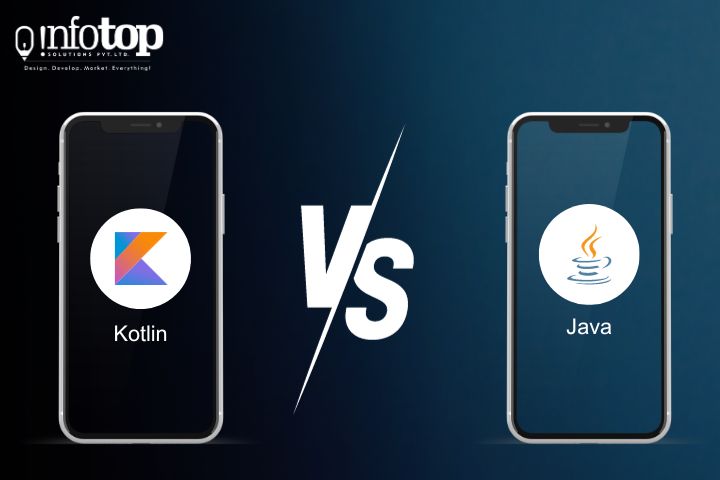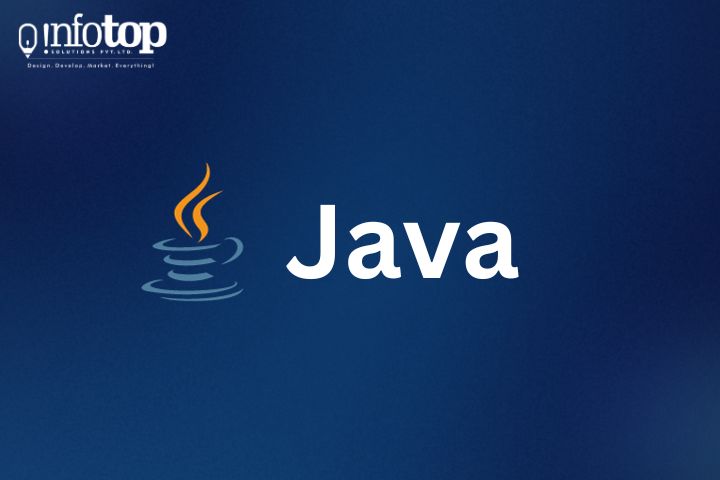
Java and Kotlin represent object-oriented languages, yet they serve distinct purposes. Kotlin takes precedence in Android application development, while Java holds greater prominence in the development of enterprise-grade web applications. To gain a deeper and more comprehensive understanding of both languages, let’s briefly examine them before delving into our discussion on Kotlin vs Java. This is particularly relevant for an Android app development company seeking insights into language choices.
What is Kotlin?

JetBrains introduced Kotlin, a relatively new programming language, in 2011. It was crafted as a more concise, readable, efficient, and effective alternative to Java. One standout feature of Kotlin in the market is its compatibility with existing Java code. Recently, Kotlin has gained popularity and found applications in companies such as Google, Amazon, Netflix, and Twitter.
Characteristics of Kotlin
- Compiles into JVM Bytecode
- The Kotlin Compiler adopts a fail-fast approach
- Compiles into JavaScript
- Modern features
- Analog to Swift
- Concise code
- Open Source
- No runtime Overhead
Pros
- Lowers the possibility of bugs
- It is simple to comprehend
- More reliable
- Boost productivity
- Integrate with the Java code that is already there
- Maintenance ease
Cons
- Slow Compilation Speed
- Differs from Java
- There are limited resources for learning Kotlin
What is Java?

James Gosling created Java, a widely acclaimed and popular object-oriented programming language. Java empowers developers to construct enterprise, desktop, cloud-based, and web-based applications. Developers widely utilize Java in the back-end development of web applications, and it holds a prominent position in Android application development. Additionally, the Java language serves as the foundation for Android itself.
Characteristics of Java
- Simple
- Robust
- Multi-Threaded
- Neutral Architecture
- JIT Compiler
- Portable
Pros
- Simple
- Robust
- OOP features
- Platform independent
Cons
- Memory Consumption
- Confusing licensing models
- Lack of low-level programming support
- Verbosity
Compare Kotlin and Java in-depth
Now, let’s delve into an in-depth comparison of Kotlin and Java under various categories such as Popularity, Type of Programming, NullExceptions, Coroutines, and more, after having provided a broad overview of the Kotlin vs Java comparison table.
1. Interoperability
As we understand, interoperability involves sharing and using a single code. Kotlin efficiently incorporates this functionality, and JetBrains, while enhancing Kotlin’s interoperability, ensured extensive compatibility with existing Java code. This feature is advantageous for product owners looking to migrate their projects from Java to Kotlin. Similarly, the reverse holds true, making it feasible to use Kotlin with Java.
2. Checked Exceptions
Kotlin frees product owners or developers from the hassle of catching and declaring exceptions, while Java requires this practice. This results in a perk: the final code becomes more efficient and gains improved error-handling ability.
3. Casting
In Java, developers or product owners must check the variable type of an object to cast it based on the operation; this is a requirement imposed by Java. On the other hand, Kotlin employs a smart cast feature that automatically handles casting checks and manages redundant casts.
4. Data Classes
When comparing Kotlin and Java data classes, Java requires product owners or developers to explicitly establish fields or variables for data storage, along with the constructor, getter and setter methods and other necessary functions. In contrast, Kotlin simplifies the process of creating a data class by requiring the ‘data’ keyword in the class definition.
5. NullPointer Exception
In the Java programming language, it is possible to assign a null value to a variable, indicating that the variable refers to no object. This can lead to NullPointerExceptions when attempting to reference it. In contrast, Kotlin has built-in null safety, preventing the default compilation of code if there is an attempt to assign null values to variables or objects.
6. Object-Oriented Programming
Java is an object-oriented programming language, whereas Kotlin combines the features of both object-oriented programming and functional programming, incorporating elements like delegates and extension functions.
7. Conciseness of Syntax
Java adheres to the traditional, verbose approach in code writing. In contrast, Kotlin, a modern programming language, embraces the principle of conciseness. Renowned for its brevity, Kotlin enables a substantial reduction in boilerplate, leading to fewer lines of code compared to Java. As a result, Kotlin code is more readable and less susceptible to human-made errors.
8. Coroutines Support
In both Kotlin and Java, which are programming languages, you can create multiple background threads to manage complex or lengthy operations and avoid complications in the main thread, where components of the same application run in Android Studio. This task is cumbersome in Java, but in Kotlin, it is a simple process.
9. Wildcard Types
Wildcard types, represented by question marks in generic programming, typically denote an unknown type. Java features Wildcard Types, which are advantageous in scenarios such as specifying the type of a parameter, local variable, field, or return type. In contrast, Kotlin lacks Wildcard Types, unlike Java.
10. Primitive Data Types
Primitive data types determine the values a variable may contain and the operations applicable to it. Java encompasses eight data types: byte, short, int, long, float, double, boolean, and char. In Kotlin, product owners initialize variables in the Primitive Type, treating it as an object.
11. Type Inference
Type inference in Kotlin automatically deduces data types for specific expressions, eliminating the need for product owners to declare the type of each variable separately. In contrast, Java lacks type inference, requiring product owners to specify each variable before declaration explicitly.
12. Extension Functions
Extension Functions, a feature of Kotlin, facilitate the development of Android applications by providing the option to augment classes with new functionality without the need to inherit from them or adhere to design patterns like the Decorator. Kotlin permits the extension of class functionality, whereas Java lacks extension functionality.
13. Implicit Widening Conversions
Implicit Widening is the process of implicitly converting data types, and Java provides Implicit Widening Conversions. In contrast, Kotlin requires you to perform Implicit Widening explicitly, as it does not offer implicit conversions to avoid precision loss.
14. Android Development
Recently, there has been a heated debate among product owners about Kotlin versus Java for Android development. Google asserts that Kotlin is the preferred language for Android application development services, providing substantial evidence of its efficiency in developing Android applications. Simultaneously, Java is also considered well-suited for creating Android applications.
Read More: Kotlin vs Flutter: Choosing for Android App Development
Java apps run efficiently on any platform as it is platform-independent. Java also has its runtime environment and an API. Therefore, when considering Kotlin versus Java for Android development, it can be collectively inferred that both are equally and efficiently capable for developing applications on Android.
A qualified partner can help you make the right decision
Choosing between Kotlin and Java for your 2024 project depends on various factors. While both languages have their merits, considering the specific requirements of your project is crucial. A qualified software development company can provide valuable insights and guidance in making the ideal choice. Evaluating factors like performance, ease of development, and platform requirements will ensure that your project aligns seamlessly with your goals.If you’re a business owner still uncertain about making a final decision, reach out to a software development company in India, such as Infotop Solutions. Let our team of experts guide you through your backend web application development journey.
